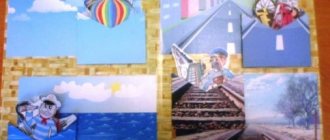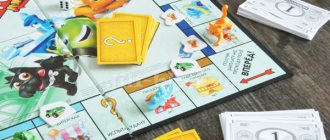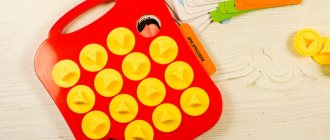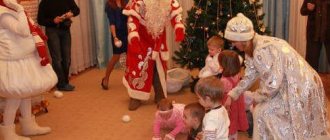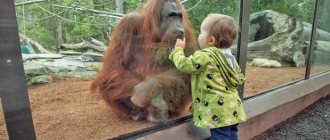Earth, air, water, fire
An interesting word game for children for quick thinking. The participants of the game form a circle, in the middle of which the driver stands. He throws a ball or a balloon to the players in turn, naming one of the elements: earth, air, water or fire.
If the driver said the word “Earth!”, then the one who caught the ball needs to quickly (while the driver counts to five) name some domestic or wild animal; to the word “Water!” the player answers with the name of a fish or aquatic animal; to the word “Air!” – the name of a bird (flying insect). At the word “Fire!” everyone should wave their hands.
The one who makes a mistake or cannot name the animal is eliminated. You cannot repeat the names of animals, fish and birds.
Verbal volleyball
In this game, participants stand in a circle and throw a ball or balloon to each other. In this case, the player who throws calls any noun, and the one who catches the ball needs to name a verb that has a suitable meaning, for example: the sun is shining, the dog is barking, etc. If the player calls an inappropriate verb, he is eliminated from the game.
There is one answer to all questions
You need to prepare cards in advance with the names of various household items. These can be kitchen utensils, household appliances, household and other items, for example: a frying pan, a saucepan, a vacuum cleaner, an iron, a broom, a mop, etc.
The players sit in a circle. The presenter approaches each participant and offers to pull out a piece of paper with the name of the item from the hat (box). When everyone has sorted out the cards, the leader stands in the center of the circle and the game begins.
The host asks the players in turn a wide variety of questions, and the players must answer these questions only with the names of the items they received on the cards (in addition, only prepositions are allowed).
Rules: you need to answer questions very quickly, while the one talking with the host is prohibited from laughing, while the rest of the participants can deliberately make him laugh.
Options for questions and answers:
- What is your name? - Mop.
- What do you use to brush your teeth in the morning – a vacuum cleaner.
- What's the name of your hairstyle? - Washcloth.
- Who are your friends? - Frying pans.
- What do you have instead of eyes? - Spoons.
The main task of the presenter is to come up with questions whose answers involuntarily cause laughter both from specific players and from all other participants. The player who laughs is eliminated from the game. The most calm participant who knows how to restrain his emotions wins.
The answers are out of place
The essence of the game: any questions from the presenter must be answered very quickly, without hesitation, with any proposal that is not related to the question asked.
For example, the presenter asks: “Isn’t it wonderful today?” The player needs to answer something like this: “I think today is Saturday.” If he makes a mistake or answers in monosyllables (for example, saying “yes”, “no”, “true” or “false”), he is eliminated from the game.
One participant in the game cannot be asked more than three questions in a row. The presenter's task is to try to confuse the player. For example, he asks: “Isn’t it wonderful weather today?” The player replies: “I think today is Saturday.”
Host: “Is it Saturday today?” Player: “I love going to the movies.” Host (quickly): “Do you like going to the movies? One, two...” Player playing by inertia: “Yes” - that’s it, he lost in the dialogue and is out!
Sausage
This simple, fun game that requires no additional props can be played while sitting at a table. A driver is selected and asks everyone in turn a variety of questions.
The players’ task is to give the same answer: “sausage” or related words: “sausage”, “sausage”, etc. The main thing is to answer with the most serious face. The one who laughs first is out of the game.
The winner is the player who fully copes with his emotions and does not succumb to the leader’s provocations. Laughter during the game is guaranteed!
Backwards
A fun outdoor game for children. The presenter tells the participants words denoting the names of the objects, and the players need to quickly find this object and hand it to the presenter. The difficulty lies in the fact that the presenter calls all the objects “backwards”, for example: cham, akzhol, agink, alkuk (ball, spoon, book, doll). Fun for kids guaranteed!
Will you go to the ball?
A fun word game for quick reaction for a small company. The essence of the game: participants are not allowed to laugh (or even smile!), or say the words “yes”, “no”, “black” and “white”.
Anyone who violates these conditions gives the game host a phantom - any item he has, after which he is eliminated from the game.
When there is no longer a single player left in the game, everyone who gave forfeits buys them back by completing fun tasks invented by the presenter.
The game begins with the presenter approaching each player in turn with the words: “The lady sent you a golik and a broom, and a hundred rubles of money, she told you not to laugh, not to smile, not to say “yes” and “no”, black and white not wear. Will you go to the ball?
Examples of possible dialogues with player errors:
- - Will you go to the ball?
- - I'll go.
- - Or maybe you’ll stay at home?
- - No , I’ll go. Oh…
- — What color will your dress be? White?
- - Yellow.
- - Then the hat, of course, will be white?
- - Not white , but pink. Oh…
- —Will you go in a carriage?
- - Most likely, in the carriage
- — What will you wear to the ball?
- - Nice dress.
- - Black?
- - Blue.
- — Will it be sewn specially for this ball?
- - Certainly.
- - And you will be the most irresistible lady at the ball?
- - Necessarily.
- - And you will kiss everyone?
- - No! Oh…
During the game, the host tries to make the person answering laugh; in addition, he asks questions so that forbidden words are spoken as soon as possible, and the players pay for it with forfeits.
- Quest for a man: for a husband, for a loved one, for a friend for a birthday or anniversary
- Quest for a woman: for a wife, for a girlfriend, for a friend, sister, daughter or employee for a birthday (Anniversary)
- Team quest game indoors (in an apartment, cottage, office), or searching for a hidden surprise using clues
- Quest game, or searching for hidden gifts for a child’s birthday 6, 7, 8, 9, 10 years old
- Team quest game for children
- New Year's quest game: searching for hidden gifts indoors (in an apartment, cottage, office)
Source: https://super-positive.ru/vesjolye-slovesnye-igry-dlja-detej/
4. "Words"
The first player says a word, the second player says a word starting with the last letter of the previous word.
Example: Shirt – Archaeologist – City – House, etc.
A more difficult option: come up with words starting with the last two letters of the previous word.
Example: TelnyashKA – KayuTA – Taxi – Syrup, etc.
Attention! In the complicated version, there may be words whose last two letters do not allow forming a word (for example, “foreigner”, “character”). If all players agree that a new word cannot be formed from the last two letters, then in this case the last letter is taken for word formation, as in the usual version of the game.
Word games for the middle group of kindergarten: selection with conditions, photos and videos
Verbal games are an indispensable form of work with preschoolers, and not only in the educational field of “Speech development”. With their help, both educators and parents can easily and unobtrusively develop the intelligence and cognitive abilities of children, expand and clarify the little ones’ knowledge about nature, the objective world, and relationships in society.
Since the thinking of children of the fifth year of life moves from visual-actional to visual-figurative, that is, for better assimilation of information, children still need support from the image of objects, situations, purely verbal games, in which only words and actions are used, at this age they use less, than in senior preschool. But there are still easy word games, they quickly become understandable and loved by children. Such games are very convenient and popular because they can be used while walking, in transport, in line at a clinic or store to keep your fidget busy.
Word games can be a great way to communicate at home with your family.
Verbal games not only develop and educate the child, but also help to establish contact with adults and peers, teach the art of communication, and the ability to listen to the interlocutor.
- “Say the opposite.” The adult invites the child to remember a word that is opposite in meaning to the one he himself named: “Small - big, long - short, high - low, etc.”
- “Call me kindly.” The child is asked to form the diminutive form of the noun: “Cat - cat, house - house, water - water.” Children who show increased interest in such a game can be offered a complicated version, in which they need to choose the diminutive form of the adjective: “Blue - blue, old - old, sweet - sweet.”
- “Which one, which one, which one?” The adult invites the child to come up with more words to describe an object or phenomenon: “What apple? (Red, round, smooth). What's winter like? (Cold, snowy). What kind of children are they? (Smart, cheerful, kind, obedient).”
- "It flies - it doesn't fly." Children need to listen carefully to the words being called and find the names of creatures or objects that can fly. If they are named, the children indicate them by clapping their hands or by saying “yes.” “Elephant, locomotive, plane (yes), cat, orange, butterfly (yes), table, sofa, helicopter (yes).” The games “Living - Inanimate”, “Edible - Inedible” are played in a similar way.
- “Find where it is.” The child is asked to look around carefully and find a bush, a door, a window, a flowerbed, a painting near him (depending on the location, the objects will be different), and point to them. In the first half of the school year, the teacher himself names the position of the object (far, close, left, behind). From the second half, the preschooler is offered to do this.
- “It happens - it doesn’t happen.” An adult recites a text that contains logical inconsistencies, and a child listens for errors. “Winter has come, flowers have bloomed, birds have sung. In autumn, the leaves on the trees turned green. In the summer, children build a snowman."
Many word games require active mental activity from the preschooler - "Many and one." An adult names the plural of a noun, a preschooler must put it in the singular: “Many dolls - one doll, many bears - one bear, many clouds - one cloud.”
- “Yes and no.” The child needs to name what is in the forest, in the river, in kindergarten, in the city, etc., and what is not. “In the forest there are trees, animals, no houses, no cars.” The first two or three times the game can be played with hints: “Are there toys in the kindergarten? (Yes). What about forest animals? (No)". If children show a high interest in the game and are well oriented in the world around them, the game can be diversified with elements of fantasy, turn to the child’s favorite fairy tales, cartoons: “What is there in a magical land? In the world of Smeshariki, Fixies? Game option: “Where can we find it?” (Where can we find mushrooms? Toys? A cow? A piano?).
- “Finish the sentence.” The adult pronounces the beginning of the phrase, the child needs to logically complete it: “There’s... a car driving along the road. The bunny loves to eat... carrots. The birds flew away in the fall... to warmer climes.”
- “What will fit?” The child needs to name objects that will fit in the palm of his hand, the back of a car, a basket, or a room.
- "Necessary gifts." The adult names the objects, the child comes up with who can give them to (a hammer - to a builder, a craftsman, a rattle - to a baby, nuts - to a squirrel).
- "Good or bad". The presenter briefly describes the situation, the children determine whether the heroes did good or bad. “The boy helped the old lady carry her heavy bag home. Is it good or bad? The girl fell, and her friends laughed. Vitya ate a lot of sweets. Grandfather and grandson planted an apple tree.” At the beginning of familiarization with the game, the adult explains why the situation is good or bad; by the middle of the year, it is necessary to encourage children to make independent value judgments.
- "Our assistants." Children, together with an adult, answer the questions: “What can our hands do? (Take, draw, stroke, sculpt). Legs? (Run, jump, stomp), Eyes? (Look, blink, squint).” Game options: “Who is doing what?”, “Where we were - we won’t say what we did - we’ll show you”, in all of them you need to guess the action and name the verbs.
- “Guess by the description.” The child guesses the object based on the description of its signs and properties: “Round, rubber, rolling - a ball. Long, warm, knitted scarf.” From the second half of the school year, the adult and the child can change places: the child chooses an object, describes it, and the adult guesses. As an option, you can guess fairy tale characters, treats, toys, vegetables and fruits, that is, narrow the search field and make the task easier for your child.
- "Songs". Correct pronunciation of sounds is practiced in this simple game. An adult asks a question, the children need to reproduce the “song” clearly and correctly. “How does the cockerel crow? (Crow). What is the wolf's song? (Uh-uh-uh). How does a mother rock her baby? (Ah-ah). How does a hedgehog puff? (Pfft). Is the snake hissing? (Ssss).” When familiarizing yourself with the game, the “songs” are voiced by an adult.
In the game “Songs” it is necessary to monitor the correct articulation of the child’s lips
Exercises and tasks
The main exercises and tasks that need to be done daily at home for the active development of coherent speech are:
Articulation gymnastics
- Eat some jam. You need to imagine that after eating the pie there is jam left on your lips that needs to be licked. Using your tongue, smoothly lick the jam from the lower and upper lips.
- Spade tongue. It is necessary to imagine that the tongue is a shovel, which should lie on the stand (lower lip) for as long as possible. We extend the tongue, placing it on the lower lip, and hold it in this position for 10-15 seconds.
- The tongue is a needle. You need to imagine that the tongue is a thin needle that needs to be held in place. We stretch out our tongue, trying to make it narrow, and try to hold it for 10-15 seconds.
- I'm a horse. The child needs to imagine himself as a horse that clatters its hoofs and clicks its tongue. We stomp our right and left feet in turn, clicking our tongue as we do so.
These exercises are best done for no more than 5-7 minutes and repeated 2 times a day.
It’s more fun to do articulation gymnastics with children by looking at pictures and reading rhymes.
Finger games
- Kitty. Both palms are clenched into fists and lie on a flat surface. It is necessary to simultaneously straighten the fingers on both handles, pressing them tightly to the table. The exercise must be repeated 4-5 times. After several lessons, the task can be complicated: first, the fingers on one hand are straightened, then they are compressed, and on the second they are straightened.
- Let's treat the cat with milk. Palms as if scooping out milk.
- Bunny. The fingers imitate the ears of a bunny, the fingers run along the table, clenched into a fist, fist in fist.
- Dog. The index finger shows the tail of the dog, the fingers are clenched into a fist, the thumb is raised up, the fingers run away.
Using finger games with parallel learning of rhymes can show quite good results, since there is a strong relationship between the human hand and the speech center of the brain. The baby easily and more emotionally perceives information and reproduces it in the future without problems.
Logorhythmics
Logorhythmics is the simultaneous reading of poetry, accompanied by a certain set of movements against the background of thematic music. Initially, the adult shows everything by example, after which the child is asked to repeat what he just saw.
The optimal time to complete this task is the second half of the day, the regularity of classes is every 1-2 days.
A special place in speech development classes is given to cartoons, which children love so much. There are specially designed cartoons aimed at reinforcing the letters of the alphabet, learning colors, learning to count and speech development.
The choice of cartoons remains up to the parents, but a prerequisite is its versatility (for both boys and girls), the presence of positive characters, and high quality video and sound.
Tongue Twisters
Tongue twisters for children are small rhyming phrases, often with a specific plot. Thanks to classes on tongue twisters, speech clarity is effectively developed and vocabulary is replenished. There are the following types of tongue twisters that are used during speech development classes:
- Containing the sound [L]: “The Christmas tree has needles, needles and pins at the Christmas tree,” etc.
- Containing sounds [Z], [Zh], [S], [Sh]: “Six mice in the reeds, ShurShat”, etc.
- Containing the sound [P]: “The beavers are going to the cheese forests. Beavers are kind, beavers are good”, etc.
- Containing the sounds [З] и [Зь]: “Zoya’s Bunny is called ZaZnayka”, etc.
Properly selected tongue twisters for speech development, provided regular practice, can significantly improve diction and develop competent speech.
If you do not approach the problem of children's speech development in a timely manner and with all seriousness, then in the near future they may have difficulties in learning at school and in communicating with classmates (due to incorrect pronunciation of sounds). This is fraught with ridicule, a decrease in the child’s self-esteem, and the disappearance of the desire to learn and communicate with others. Therefore, the development of speech in children aged 4-5 years should become a priority task for parents themselves, who can actively work with their children at home, in a playful way.
Card index of word games for speech development
Card index of word games for speech development
- 1. “WHO HAS WHO”
- The cat has a kitten, kittens
- The dog has a puppy, puppies
- The pig has a piglet, piglets
- A cow has a calf, calves
- The horse has a foal, foals
- A sheep has a lamb, lambs
- The tiger has a tiger cub, cubs
- The fox has a little fox, fox cubs
- A goat has a kid, kids
- The bear has a teddy bear, cubs
- A wolf has a wolf cub, wolf cubs
- The hare has a little hare, little hares
- A hedgehog has a hedgehog
- The lion has a lion cub, lion cubs
- The frog has a little frog, little frogs
- Cow - moos (moo)
- The dog barks (woof-woof)
- Pig - grunts (oink-oink)
- The horse neighs (yoke-go)
- Sheep - bleats (ba-e)
- Cat - meows (meow)
- Frog - croaks
- Chicken - clucking
- Duck - quacks
- Beetle - buzzing
- Wolf howls
- Sparrow - tweets
- Crow - croaks
- Tiger - growls
- Rooster crows
- Cuckoo - cuckoos

